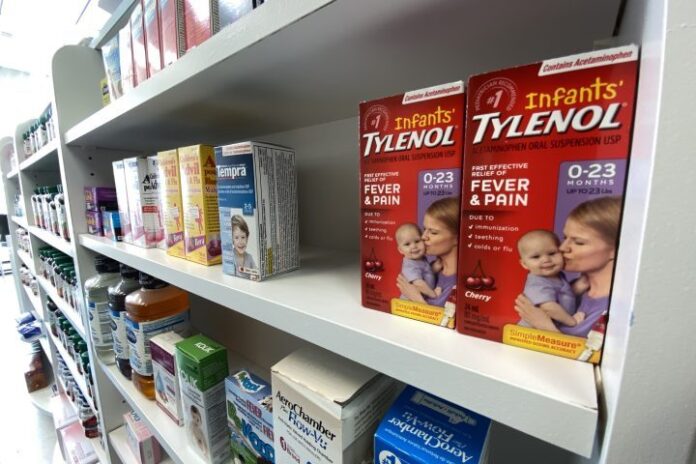With an ongoing shortage of children’s pain medication in Canada, pharmacists say parents should be cautious in substituting pediatric medications with drugs like Advil and Tylenol made for adults.
Pharmacists have been fielding an increase in requests for help from parents in navigating the shortage, including questions about whether it is safe to give their children adult versions of ibuprofen or acetaminophen — the generic names for Advil and Tylenol respectively — to help with high fever or pain.
Barry Power, a pharmacist and editor-in-chief of the Canadian Pharmacists Association, says parents can give children adult Advil and Tylenol, but it’s important to ensure the proper dose is administered.
He says he is concerned about accidental overdoses of children given too much of these adult medications.
“It’s easy to give the wrong amount,” he said.
A full regular strength tablet or pill should only be given to children aged 12 or older. For younger children, pills can be cut into halves or smaller pieces and either swallowed or crushed in soft foods like applesauce to help mask the flavour, he said.
However, figuring out the right dosage or how much of an adult tablet should be used can be tricky, as it depends on the weight, rather than the age of the child.
Giving children, or anyone, too much of these medications can lead to liver damage, he said.
That’s why Power says parents considering cutting adult medications for their children due to the shortage should consult an expert for help determining the correct dosage.
“It’s absolutely critical that if you are going to go down the path of cutting up tablets that you talk to a pharmacist or your physician to find out the appropriate dose,” he said.
“And it’s something that you need to think about very carefully.”
Acetaminophen is one of the most commonly overdosed drugs in the world because people often accidentally take too much by taking Tylenol in addition to cough or cold medications that also contain acetaminophen, he said.
1:52
Pharmacies make compounded kid’s pain medication amid ongoing shortage
And while antidotes to accidental overdose are available, it’s better to avoid getting to that point, Power cautioned.
“The main problem with acetaminophen poisoning is that it’s often asymptomatic or there’s no signs of symptoms until it’s very advanced and in quite a difficult situation,” he said.
Since the summer, infant and children’s acetaminophen and ibuprofen products have been in limited supply in retail outlets, pharmacies and hospitals across Canada.
Health Canada says the shortage is due to unprecedented demand. It recently approved the importation of ibuprofen from the United States and acetaminophen from Australia to supply hospitals in Canada.
Manufacturers of these drugs in Canada have increased production by 30 per cent, but demand continues to outstrip supply, Power said.
1:22
Trudeau says Health Canada taking steps to get children’s pain medication back into stores
A spokesperson for Johnson & Johnson, which manufactures Tylenol products in Canada, told Global News in a statement last week its Canadian manufacturing site is “running 24 hours a day, seven days a week and products are shipping across the country every day”.
Haleon, which manufactures children’s Advil in Canada, also told Global News it is working hard to increase production in response to the unprecedented demand and encouraged consumers to only buy what they need.
The spike in demand comes as Canada is experiencing an early onset of flu season and a particularly big increase in the number of children getting sick with respiratory syncytial virus (RSV), all while COVID-19 continues to circulate.
A number of children’s hospitals across the country, which have already struggled with staffing shortages, have been swamped with families bringing their sick kids to ERs, prompting some hospitals to urge parents to only take their children to emergency departments in cases of severe illness or injury.
“The timing couldn’t be any worse,” said Dr. Anna Banerji, a pediatric infectious diseases specialist.
The medication shortage is exacerbating an already overburdened health system, she said. Some desperate parents are taking their children to ERs, hoping to get prescriptions for their sick kids.
“That’s adding fuel to the fire where parents are anxious about the fact that there’s no hospital beds, but also, when kids are getting sick right now, they don’t have the basic medications to take down the fevers or to address their pain.”
Banerji echoed Powers’ caution to parents that, while it can be safe for children to take adult Advil or Tylenol, they must ensure they are giving the proper dose.
“If you your child is a bit older, then it’s not so difficult to calculate how much ibuprofen or acetaminophen they would need… But when it gets to the younger babies, I would make sure that you double check or get someone to help you figure out the actual doses.”
Justin Bates, CEO of the Ontario Pharmacists Association, says parents nervous about figuring out their own how to cut and properly dose adult pain medications for their child can sometimes access compound solutions from their local pharmacy.
These liquid formulations are mixed by pharmacists to ensure the exact proper dose needed for an individual child. But not all pharmacies offer this service, Bates said.
When pharmacies do get shipments of children’s pain medications, some may also choose to introduce point-of-sale limits, to prevent hoarding, he added.
“If we don’t match the supply with the demand and do things to help — whether it’s importing from the U.S., rationing and looking at other mechanisms — then, my concern would be we will continue to be in a precarious position with the supply chain all the way through the winter.”



